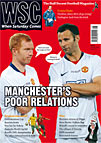 Darlington’s time in administration may be over but the town’s community has suffered longer-term harm, says Thom Kennedy
Darlington’s time in administration may be over but the town’s community has suffered longer-term harm, says Thom Kennedy
After a miserable period in administration, optimism is seeping back to League Two Darlington. However, while rebuilding within the club is moving along rapidly, the manner of the club’s exit from administration remains a source of discomfort.
Ex-chairman George Houghton, reviled among fans for the timing of administration, is set to force through a Company Voluntary Arrangement (CVA), writing off almost £8 million of debts with a deal worth less than a penny in the pound to creditors. He will then sell the club to a new owner, Teesside businessman Raj Singh.
Singh has quickly impressed fans, having shown a love of football and a desire to run the club sustainably within its means. Now, for the first time since March’s administration bombshell, fans’ plans do not rest on establishing a new club at Brinkburn Road, home of the town’s non-League representatives, Darlington Railway Athletic.
For all the supporters’ receptive murmurings, Singh faces a trickier task in convincing the rest of the town that the club, celebrating 125 years of existence this year, is still an integral part of the community. Darlo haven’t made many friends during administration, thanks to the paltry sums on offer in the CVA – the second similar situation in five years – which will leave businesses in the north-east and beyond collectively £360,000 poorer. It’s understandable that traders are disgruntled at the deal, and that sympathy with the 3,000-strong core of fans desperate for the club to survive has given way to aggravation.
For the second time, St John’s Ambulance has missed out on a considerable sum of cash because of the club’s mismanagement. The charity is owed around £2,500 but could end up with just £25. Having received a similar package, one hotelier who put up loanee Liam Hatch has been outspoken in criticising the club’s treatment of local businesses. Between them, other League clubs are due £100,000. They will be paid in full. Six-figure bills owed to Durham Constabulary and Darlington Borough Council suggest the club’s mess will raise eyebrows among the county’s more influential bodies. With the land around the stadium still in council hands, the club would be as well to prove it is an asset to the borough.
Darlington are a small town club made into a pariah by excessive ambition, and are learning an important lesson on behalf of other cash-strapped clubs: is it really worth detaching a club from the community in which it is based, and potentially sacrificing the club’s whole future, for the sake of an attempt at football one division higher? Although the CVA needs to be approved by those responsible for 75 per cent of the total value of debt to avoid a points deduction, the Quakers will probably start next season on an even keel because most of the debt is owed to Houghton and his associates.
While fans are delighted that the new term isn’t a write-off before it has begun, it’s embarrassing to feel that the club has become a millstone to small businesses in County Durham. Photographs from a previous crisis in the 1970s capture town businessmen waving flyers bearing the slogan “Save The Quakers”. In 2004, as George Reynolds, the former chairman who built the financially burdensome new stadium, was ushered out through the marble halls of the Darlington Arena, 88 per cent of creditors voted for a penny-in-the-pound deal to save the club.
It’s hard to imagine a similar reaction now. A march in support of the club attracted a couple of hundred and a fundraising game drew only 3,000; more than 10,000 watched a similar match in 2004. Fans in the town have always been more inclined towards Sky’s top-flight games than live action, and a stayaway attitude has played its part in creating the problems. Now more than ever Darlington is divided between those who dislike the club for its lack of success over the years, and others who feel the club is more a burden than a boon.
Supporters may struggle to ignore a pinching sense of guilt about the manner of the club’s rescue. Singh has a difficult job on his hands to encourage companies both locally and nationally to do business with a club that’s tainted by a financial history which is nothing short of dreadful.
From WSC 270 August 2009